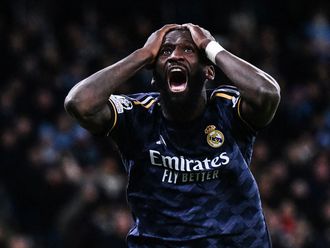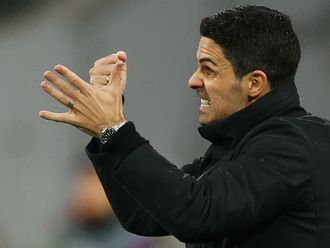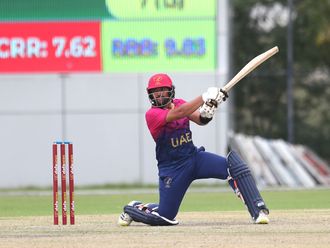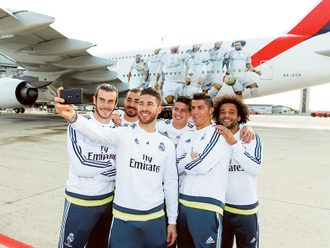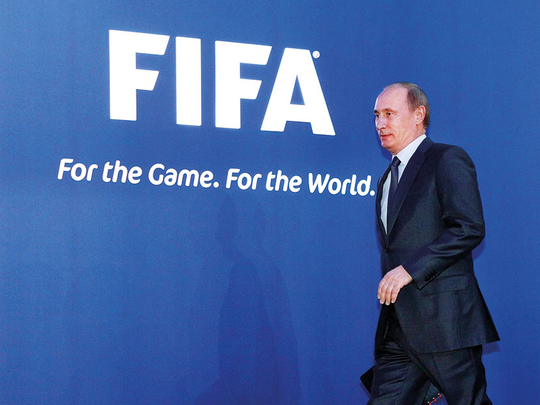
Moscow: Vladimir Putin is not a football fan — ice hockey has always been his passion — but eight years ago, in the hours after FIFA declared Russia would host the 2018 World Cup, he told a story designed to illustrate that he grasped just what the event, and the sport, could do for his country, and for the world.
Putin had landed in Zurich only a few hours earlier, after Russia had been awarded the tournament. As the country’s prime minister at the time, he wished to bask in the glow of an unexpected victory.
He was rushed immediately to a celebratory news conference. The tone, for the most part, was exultant, as Putin explained how Russia’s oligarchs and corporations would be leaned on to finance the billion-dollar jamboree.
Chelsea owner Roman Abramovich, in the audience, beamed at the idea.
As he told the story, though, Putin grew almost wistful, romantic. He was born in Leningrad just after the Second World War, he said. As a child, he had been told how the city had suffered during the conflict: The siege of what is now St. Petersburg lasted almost 900 days. There had been “no electricity, no running water, no heat in a Russian winter.”
German shells landed every day.
But he spoke of how — at the height of the siege — “football matches were held, even at that tragic time.” They had “helped people stand tall and survive.”
“Football brings a spark into the lives of people, young and old,” he said.
That was what Putin dreamed the World Cup could do for Russia, went the metaphor: to illuminate a nation, to inspire a people, to help a vibrant, rapidly modernising nation stand tall.
He wanted the World Cup to showcase that Russia was not what it used to be but had become something new, something different. He wanted to prove that “we are an open and transparent country to the world.”
The hundreds of thousands of fans who would descend on Russia in eight years’ time, he said, would find facilities of “the highest standard,” delivered “on time and to perfection.” They would discover a country that was nothing like the one they remembered from school or had heard about on the news.
“A lot of stereotypes from previous times, from the Cold War era, fly all over Europe, and they frighten people,” Putin said then. “The more contact we have, the more these stereotypes will be destroyed.”
Russia — his Russia — was different now. The World Cup would prove it.
Eight years later, relations between the West and Russia are as strained as they have been since the fall of the Berlin Wall.
It has been accused of interfering not only in the US presidential election but also in the vote on whether Britain should leave the European Union.
And yet — extraordinary though it is to say it, given all that has happened between the vote to award the hosting rights and the tournament’s opening game in a few days’ time — there was a grain of truth in Putin’s logic in 2010.
That story about war-torn Leningrad was more than just empty rhetoric.
It is not necessarily admirable, or praiseworthy, or right, but once the tournament starts, once the largest sporting event in the world is in full flight, a transformation will take place.
In Brazil four years ago, huge strikes were timed to coincide with the World Cup to highlight social injustice and endemic corruption in the country. The world noted it and then tuned in to the matches, anyway.
It will not necessarily be the quality of the football: The game in its highest form is now played in the Champions League, not on the international stage. If you want slick, dizzying style, watch Barcelona or Manchester City. If you want breathless, breakneck chaos, go for Liverpool or Borussia Dortmund. If you want star power and soap opera, nothing touches Real Madrid and Paris St Germain.
For tension, though, still nothing quite beats the World Cup.
Will this be the year that Lionel Messi finally delivers the trophy to Argentina?
Can Brazil, driven on by Neymar, avenge the national humiliation of 2014? Will Germany become the first country in more than half a century to retain the World Cup, or is this the moment for Spain or France to reclaim the crown?
For romance, too: Egypt is back, 28 years since it last appeared, inspired by the beaming Mohamed Salah; Panama and Peru declared national holidays simply for qualifying; Iceland, with its thunder-clapping fans and its dentist-turned-manager, will be the smallest nation ever to take part in the jamboree.
The world will watch, as it always does.
It will find heroes to love and villains to loathe. It will rise in joy and sink in despair. The World Cup is a thing all of itself; to many, to most, in the heat of it all, what matters is the field, and the goals — not where they are.
Most important, Russia will watch, too, and that is what always mattered to Putin: not how the world sees Russia, but how Russia sees itself.
Its team — the lowest-ranked host in history — seems likely to offer little: Expectations in Russia run no higher than simply not exiting at the earliest available opportunity. Even Putin has not tried to associate himself with the national side: As the timing of his visit to Zurich in 2010 proved, he is not prepared to countenance even the slightest stain of defeat.
What matters more is how Russia responds off the field: Can it prove to itself that it is the nation Putin preaches that it is?
Can it deliver a spectacle — even in the face of reinforced sanctions, introduced after the Skripal poisonings — worthy of the superpower of its president’s vision?
That is what Putin wanted from this tournament, why he supported the bid in the first place: a chance to stage a vision of his Russia to Russia. That comes with a considerable risk, however, one that will provide the most fascinating — and possibly most important — subplot to the tournament.
They still talk, in Russia, about the children of the 1980 Olympics: the generation that had the chance to welcome athletes and fans from around the globe at the height of the Cold War and that was inspired not by how different they were, but how alike. Eager to put on a show, Soviet authorities stocked shops with Pepsi and Marlboro cigarettes for visitors to the games. Five years later, the era of glasnost and perestroika began.
Nearly four decades on, what impact could the influx of thousands of fans, from Colombia and Tunisia and Iceland and all points in between, have on a country that its president has worked so hard to imbue in the myth of its own difference?
This may not be a World Cup that changes how the world sees Russia. But it could be a World Cup that changes how Russia sees not only itself, but the world as a whole.
— New York Times News Service


